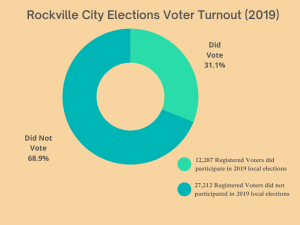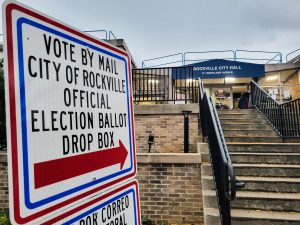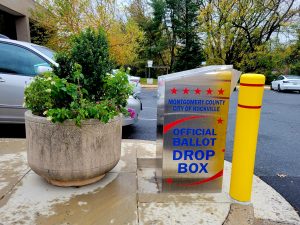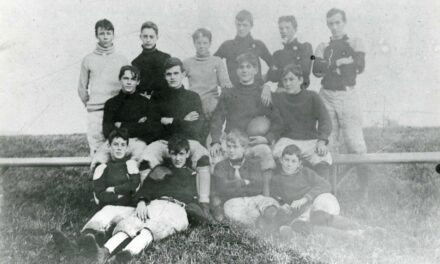As the city of Rockville, Maryland, gears up for the upcoming elections on Nov. 7, voters are presented with an opportunity to expand the scope of civic engagement to teenage residents.
Among the four referendum questions on the ballot, one stands out for its potential to transform the political landscape: should Rockville allow 16 and 17-year-olds to vote in local elections?
“I think lowering the voting age is really important because a lot of the city issues affect students,” said Sophie Nguyen, a junior at Rockville High School. “A lot of teenagers work jobs and pay taxes, they are impacted by policy changes. And if we don’t have a say, how can we really say that we’re being truly represented?”
This pivotal referendum stems from the findings of the city’s Charter Review Commission Report of 2022, which highlighted the historically low voter turnout in local elections.
Latest data from the commission reports showed that roughly 70% of registered voters in Rockville did not participate in city elections. The commission’s response to this issue was to unanimously recommend lowering the voting age to 16, aiming to boost civic engagement and representation for the city’s younger residents.

Alyssa Canty, the director of youth programs for Common Cause Maryland— a nonpartisan organization dedicated to lowering the voting age to 18, said it’s important to include high school adolescents in voting as the policies more directly impact them in the long term.
“Most teenagers get a job at the age of 15 or 16 and pay taxes to the community, but don’t have a say on how those taxes get used,” Canty said. “You also are more impacted by school board elections than, say, someone like myself, who doesn’t have children and who’s not school age. I vote for school board elections, but that doesn’t really impact my day-to-day life.”
In Maryland, cities can lower the voting age for local elections through a city council vote. In the case of Rockville, however, instead of voting, the city council left it to residents to vote on the issue through a referendum ballot.
Notably, five Maryland cities have already embraced this change, allowing 16 and 17-year-olds to cast their ballots in municipal elections: Takoma Park, Greenbelt, Hyattsville, Riverdale Park, and Mount Rainier. A sixth city, Somerset, will have 16-year-olds who can vote in local elections beginning next May.
With about 21.1% of Rockville’s population under 18, according to the U.S. Census Bureau as of July 2022, the potential impact of this policy change is substantial.
However, some residents are skeptical of allowing individuals below 18 to participate in local elections citing concerns such as maturity level and lack of political interest among teens, based on the public hearing comments from the city’s February meeting.

“It’s just unfortunate that a lot of adults don’t think that we’re responsible enough or just educated enough to vote at the age of 16,” Nguyen said.
Like many of her peers, Nguyen is actively involved in various student advocacy organizations, including the Montgomery County Regional Student Government Association (MCRSGA) and Montgomery County Students For a Change.
“A lot of us are really involved in checking up on politics, the news, and issues that we’re seeing every single day around social media,” she continued. “We have our own thoughts and opinions on it.”
In the Charter Review reports, the commission also linked the unanimous recommendation to research from Rutgers University that found 16-and-17-year-olds are “neurologically and socially mature enough to vote responsibly.”
Canty also emphasized the importance of involving younger voices in the electoral process.
“I think a lot of times we think of youth activists being college students,” Canty said. “But there’s a lot of people who are 16 and 15, that are really a part of those movements, especially the ones around gun control and how that really impacts their experience as students.”
Daniel Leuning, a 32-year-old Rockville resident, echoed the sentiment on how issues like climate change, reproductive justice, and gun control laws impact on the younger generation due to decisions made by politicians much older than the impacted youth.
“Older people in the society just have a stranglehold on the levers of power and I think that just needs to change,” Leuning said. “Especially since they’re making decisions on issues that they want to see from the past while high school and middle school kids have to deal with those consequences later down the line, even though they don’t have the agency to shape what’s going to be happening.”
This year’s latest data from the Pew Research Center shows the median age of voting House lawmakers is 57.9 years, while the Senate’s median age is 65.3 years.
Rockville’s Charter Review Commission also argued that this provision has a multiplying effect, as younger people who vote directly influence voter turnout if their parents/caretakers and older residents within their community.

According to Vote16USA, these policy shifts in Maryland have proven successful in other cities, with 16 and 17-year-old voters turning out at higher rates than their older counterparts.
For most high schools across the country, Canty said the age of 16 and 17 is when most students have their first civics and economics classes. Engaging in early voting habits would be an experimental learning in social sciences such as civic and government engagement.
“There’s no one any age that can just wake up and go vote without doing any type of research,” she continued. “So I think as long as we provide that education, it’s really critical that they get a voice in elections, to be able to influence a change.
Recalling her days as a teenager, 58-year-old resident Dana Sarti said many high school students get politically activated during this age as they become more aware of the governmental systems and policies enacted by the officials.
“I remember when I was 16 or 17, I was really interested in politics and human rights in particular at that age, and so I think now, it’s even more relevant,” Sarti said. “Given that there’s a lot in the political climate affecting 16 and 17-year-olds right now more than when I was a kid, it is definitely time that we should be letting them have their voices speaking up, as they are definitely mature enough.”

City officials mailed the ballots to registered voters earlier this month. Voters can return their postage-paid ballot to the city, or drop off the completed ballot at any time at an Election Dropbox by 8 p.m. on Nov. 7.
For the first time since 2019, voters can also cast their votes in person at two Election Day Vote Centers on the election day.




